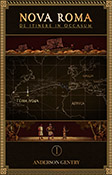Review: Nova Roma: De Itinere in Occasum 178
We usually only review books about religion and contemporary politics, but we made an exception for NOVA ROMA* for three reasons: first, we happen to know that the author, Anderson Gentry, is an atheist conservative; second, we admire the Roman Republic and appreciate how much our own civilization owes to it; third, we found that the story makes a strong contribution to an important debate pursued with ever greater intensity here and now in the West.

Don’t be put off by the Latin title. The book is written in English. And nothing it tells us about the Romans can seem strange to us in our time. The author rightly reminds us in his Introduction:
“Once all roads led to Rome. Now, Rome stands as the source of all roads that lead to modern Western civilization. In fiction and in fact, Rome excites the imagination as few other nations ever have.”
The story – which moves at a fast pace, making it a real page-turner – begins in Rome in 44 B.C.E. Caesar has crossed the Rubicon and is advancing with his army towards Rome. Some of the Senators, suspecting that he wants to be crowned king and so put an end to the Roman Republic, form a plan, not to stab him to death as happened historically, but to bring a powerful military force of their own to oppose him.
Among the would-be defenders of the Republic are Pompey, Cato, Cicero, and Brutus. They set sail with two legions, livestock, arms and horses, and the treasury gold, in forty ships bound for Spain, where Pompey has reserves of money and can recruit soldiers. But they never reach their intended destination. A tremendous storm blows them way beyond the Iberian peninsula, right across the ocean. Thirty-four ships survive to land them on the coast of an unknown continent which fifteen hundred years later would be called America.
Reconciled to the certainty that they will never be able to return home, they found a new Rome, starting with the construction of a Senate, a forum, and a protective wall, all built with wood and stone. They name their rudimentary city Nova Roma.
And they encounter the native peoples. The Romans call them Novans, regard them as primitive savages. But, needing to trade with them, they soon find that there are wise men among them, worthy of all respect. Friendly relations are established early with two tribes, but there is also a tribe of fierce warriors, and war between the Romans and Novans becomes unavoidable.
Most of the rest of the story is about the war. It is excitingly narrated and demonstrates an expertise in military tactics on the part of the author which will add to the appeal of the novel for readers who share his fascination with the subject.
We will not give away the ending, which we found not just satisfying but moving. Suffice it to say that that the resolution of the problem of how an advanced civilization can come to terms with a less developed nation to the satisfaction of both is typically Roman – and a model for our time.
* NOVA ROMA: DE ITINERE IN OCCASUM by Anderson Gentry, Crimson Dragon Publishing, Aurora, Colorado, 2020. 383 pages. Available from June 1, 2021, at $16.99 from Amazon, Barnes & Noble and other bookstores, or direct from CrimsonDragonPublishing.com. Pre-order here. The e-book at $8.99 will be available through the same, as well as Nook, iBooks, and OverDrive (Library System).

